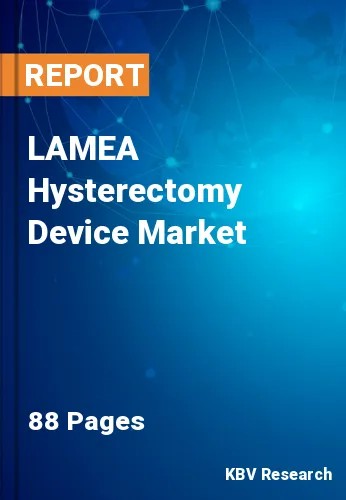The Latin America, Middle East and Africa Hysterectomy Device Market would witness market growth of 11.3% CAGR during the forecast period (2022-2028).
During an abdominal hysterectomy, the uterus is removed via a six- to eight-inch-long incision. The incision is made either along the frontal hairline or from the navel to the pubic bone. This phrase is typically used when a patient has cancer, an enlarged uterus, or when the disease has progressed to other pelvic areas. Frequently, it requires a longer recovery period and hospitalization.
Many gynecological problems are becoming more common, and uterine manipulation devices are becoming more popular due to their convenience and ease of use. Many women between 40 and 60 have UF tumors, which are more common as women age. However, some women may experience it earlier. UF typically manifests in women in their late 40s and early 50s. As a result, there is a substantial need for uterine manipulation devices due to the rising number of women with UF and the consequent increase in hysterectomy procedures. These and other reasons will drive market expansion throughout the projected period.
The frequency of overweight and obesity among Israeli adults and children has increased. 13.7 percent of adults aged 18 and older are obese, while 34 percent are overweight, according to 2008 KAP data. A disparity between the calories ingested and the energy lost via physical activity increases weight and, eventually, obesity. High-calorie fast food, an increase in portion size, and the low cost of high-calorie meals are common contributors to excessive calorie consumption. Diverse factors are increasing the prevalence of overweight and obesity, leading to an increase in illnesses such as uterine cancer, which will increase the need for hysterectomy and gadgets connected to the procedure, hence boosting market expansion in LAMEA.
The Brazil market dominated the LAMEA Hysterectomy Device Market by Country in 2021, and would continue to be a dominant market till 2028; thereby, achieving a market value of $10.4 million by 2028. The Argentina market is exhibiting a CAGR of 11.9% during (2022 - 2028). Additionally, The UAE market would witness a CAGR of 11% during (2022 - 2028).
Based on Disease Type, the market is segmented into Chronic Pelvic Pain, Fibroids, Uterine Cancer and Others. Based on End User, the market is segmented into Hospitals, Ambulatory Surgical Centers and Others. Based on Surgical Approach, the market is segmented into Abdominal Hysterectomy, Laparoscopic Hysterectomy, Robotic-assisted Laparoscopic Hysterectomy and Vaginal Hysterectomy. Based on countries, the market is segmented into Brazil, Argentina, UAE, Saudi Arabia, South Africa, Nigeria, and Rest of LAMEA.
Free Valuable Insights: The Worldwide Hysterectomy Device Market is Projected to reach USD 450.5 Million by 2028, at a CAGR of 5.5%
The market research report covers the analysis of key stake holders of the market. Key companies profiled in the report include Medtronic PLC, B. Braun Melsungen AG, ConMed Corporation, Johnson & Johnson, Richard Wolf GmbH, Karl Storz SE & Co. KG, The Cooper Companies, Inc., Laborie Medical Technologies (Patricia Industries) (Investor AB), Fortimedix Surgical B.V., and Conkin Surgical Instruments Ltd.
By Disease Type
By End User
By Surgical Approach
By Country
Our team of dedicated experts can provide you with attractive expansion opportunities for your business.

